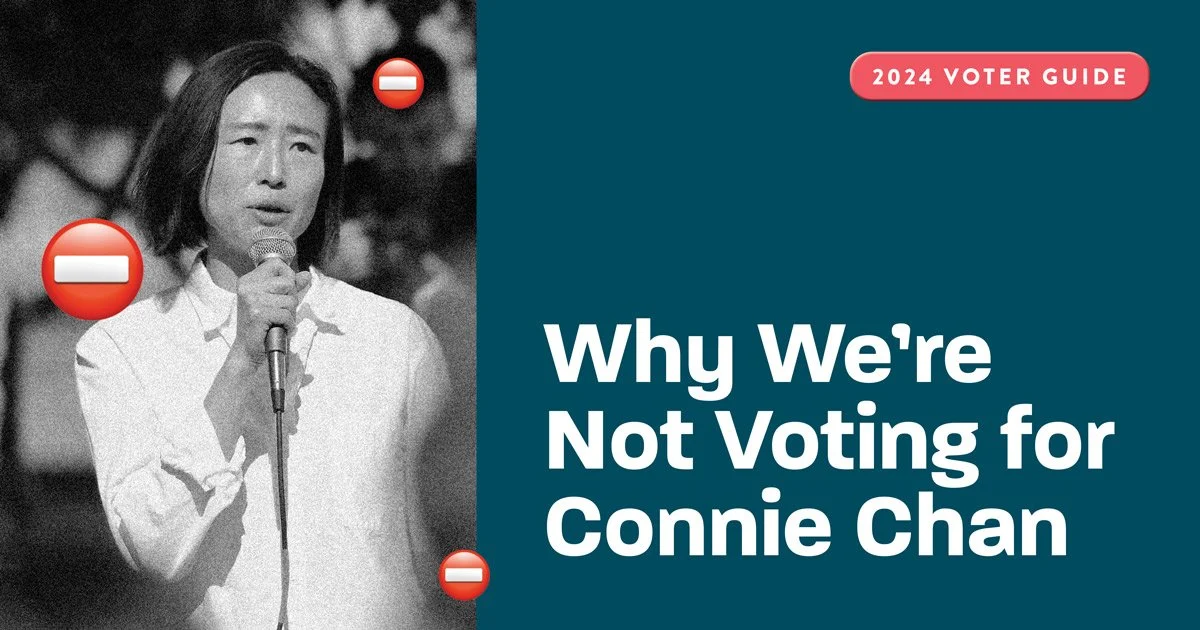Why We’re Not Voting For Connie Chan
It’s never a good sign when elected officials get booed. It means constituents are upset, they don’t feel heard, and the only recourse they think they have left is tossing a long, loud jeer in their representative’s direction. Unfortunately for current District 1 Supervisor Connie Chan, she’s been getting booed recently.
Connie Chan has served one term as District 1 Supervisor, but she’s been in politics since 2005, serving as a legislative aide to current District 3 Supervisor Aaron Peskin, among others. As supervisor, she’s allied herself closely with Peskin, and those shared positions have put her wildly at odds with voters in her district.
Public Safety Isn’t a Priority
It’s almost like whenever constituents press Connie Chan on an issue, she does the opposite. That’s okay for rebellious tweens testing boundaries, but it’s not great for elected representatives. Take public safety, one of the top issues for residents in District 1. Chan has demonstrated that she doesn’t believe San Francisco’s Police Department is the proper vehicle to address crime. Instead, she’s thrown her support behind recalled District Attorney Chesa Boudin and political mentor Sandra Lee Fewer, who infamously led a “f*** the police” chant back in 2019 when she was District 1 Supervisor.
When protesters were calling for new approaches to policing following George Floyd’s murder in 2020, Chan said San Francisco needed to “dismantle” the police department. She later walked that statement back after rising crime made her previous position untenable for voters, but she’s repeatedly voted to reduce SFPD staffing levels and budget. Now, San Francisco’s Police Department is seriously understaffed, short approximately 500 officers from the recommended level.
In 2021, Chan voted for a budget that trimmed SFPD spending, shifting funding to street crisis teams and only funding roughly two-thirds of the new police recruits requested by Police Chief Bill Scott. In 2023, as budget chair for the Board of Supervisors, Chan delayed a critical budget vote that provided emergency funding to keep officers on the street (she only budged after a massive public pressure campaign from TogetherSF Action forced her hand).
In the March primary earlier this year, Chan supported Prop B (the “cop tax”), a misleading measure that would have required a brand-new, unaccounted for tax to fund a fully-staffed police department. That same election, she also voted against Prop E, which reduced red tape at SFPD and gave San Francisco’s police access to some common technology that’s been in use in other cities for years.
That’s led to vocal criticism from District 1 residents about the way Chan has handled public safety, but instead of owning her public safety positions, she’s tried to deflect blame to Mayor London Breed. Chan blames the mayor for a lack of police in the Richmond, but she apparently hasn’t made the connection between the budget she votes for, the understaffing at SFPD, and the number of officers in her district.
Voters in District 1 have been asking for more funding for public safety the entire time Connie Chan’s been in office. For whatever reason—ideology, obliviousness, spite—she’s tried to cut the police budget instead.
A Flawed Lawmaker
Like the games she plays with public safety, Connie Chan doesn’t really listen to what her constituents want when proposing legislation. She primarily listens to her ideology, even when that leads to ridiculous or harmful outcomes.
Chan, like many ideologues in SF City Hall, believes that San Francisco should not build any new housing that’s not 100 percent affordable. She’s gone to great lengths to shoot down proposals for mixed or market-rate housing, even though these projects either include affordable housing onsite, or fund off-site affordable housing. The problem with Chan’s insistence on only approving 100 percent affordable housing, is that those projects are often financially untenable, requiring huge subsidies to get built—subsidies that are primarily funded by the impact fees on market-rate housing.
In the November 2022 general election, Supervisor Chan authored Proposition E, the “Affordable Housing Production Act,” a ballot measure that would have made it more difficult to build housing in San Francisco. The deceptive name was intentional, and Prop E confused voters enough that they voted down Prop D, a measure that would have made it easier to build more housing for San Franciscans at all income levels. The San Francisco Chronicle described the ballot initiative as “cheap political theater,”and it managed the rare feat of being "both redundant and a step backward."
This is Connie Chan’s policy M.O.: draft legislation that sounds good to voters, while disguising its true effects. She’s voted for a number of bills under the guise of “good government”—legislation that has paradoxically managed to make San Francisco the worst-run city in the country.
In response to growing complaints about graffiti, Supervisor Chan sponsored an ordinance in 2023 that revived the Graffiti Advisory Board—a commission that studies the issue of graffiti in San Francisco, but doesn’t do anything to actually reduce the amount of graffiti people have to deal with. Notably, the Graffiti Advisory Board was previously allowed to sunset out of existence in 2022, after commissioners on the board tried to sell their own graffiti removal services to people who came to the board for help with graffiti.
It’s one thing to be wrong on the issues. It’s another to be performatively wrong, just to prove a point. Connie Chan was a consistent supporter of recalled District Attorney Chesa Boudin, standing by him through his time in office. In June 2022, when it was clear Boudin would likely lose his recall election, Chan voted to put Supervisor Aaron Peskin’s Prop C on the ballot. Prop C was introduced in spite of voters—had it passed, it would have made it harder for voters to hold elected officials accountable through recalls.
Paid for by TogetherSF Action (tsfaction.org). Not authorized by any candidate or committee controlled by a candidate. Financial disclosures are available at sfethics.org.

